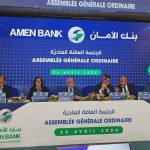






2023 has been a complicated year for the national and international economy. Despite this situation, Amen Bank continued its momentum by achieving good financial performances, while consolidating its fundamentals and continuing its transformation program.
This is what emerges from the ordinary and extraordinary general meetings for the 2023 financial year, held Thursday April 25, 2024 by Amen Bank at its headquarters, under the aegis of the chairman of its supervisory board, Rached Fourati, and the president of the board, Néji Ghandri.

“ The year 2023 was marked by a difficult national and international economic situation, closely linked to the continued fallout of the health crisis on economic activity, to inflationary pressures which affected the main drivers of growth, namely consumption and investment, and this in addition to the drop in production in the agricultural sector which was affected by the drought as well as the difficulties of the extractive industries. Despite this economic situation and the lack of international and national visibility, Amen Bank was however able to meet several challenges in 2023: strengthening financial solidity, improving financial performance, finalizing several projects and Next transformation projects and launching new ones. products for the benefit of customer segment disputes thanks to digitalization. Challenges met thanks to the commitment of all staff », indicated Mr. Ghandri.
The bank indeed ended 2023 with a net profit of 194.87 million dinars compared to 154.88 million dinars a year earlier (+25.82%), and this despite the fact that the bank had to constitute collective provisions. additional amounts of 37.69 million dinars (MD) at the end of 2023, to comply with the requirements of the monetary authority, bringing the balance of collective provisions constituted by the bank as of December 31, 2023 to 185.25 MD. In addition, the banking establishment paid 27.95 MD of tax, 798,000 dinars of social solidarity contribution in addition to 5.58 MD of cyclical contribution to the state budget for the financial years 2024 and 2025. Factors which impacted the bank's results.

Thus, the banking establishment will distribute a dividend of 97.45 million dinars (including 14.53 MD free of withholding tax). The dividend is 3.22 dinars per share (a Payout of 50%, editor's note), representing 64.4% of the nominal. It will be paid on May 14, 2024.
Let us also remember that from 2023 and over two years, shareholders benefit and will benefit from free shares, the bank having decided to increase its capital by more than 42 million dinars over two years by incorporation of reserves to bring it to 174.6 million dinars.
The first phase carried out in October 2023 amounted to 18.91 million dinars through the issue of 3,783,000 new shares with a nominal value of five dinars each, for a benefit date starting from January 1, 2023 These shares were allocated free of charge at the rate of one new free share for every seven old ones and will bring the capital to more than 151.32 million dinars.
The second phase scheduled for October 2024 and will be worth 23,280,000 dinars through the issue of 4,656,000 new shares with a nominal value of five dinars each, for a benefit date starting from January 1, 2024. These shares will be allocated free of charge up to two new free shares for every thirteen old ones and will bring the capital to 174.6 million dinars.
In addition, the price increased by 27.9% in one year, going from 26.2 dinars per share in 2022 to 33.5 dinars per share in 2023.

In 2023, customer deposits and assets recorded an increase of 9.1% (with an increase in savings deposits of +7.3% and term deposits of +16.4%, editor's note), for stand at 7.62 billion dinars as of December 31, 2023 and customer credits increased by 4.02%, reaching 7.17 billion dinars.
Net banking income (NBI) reached 539.98 million dinars at the end of December 2023 compared to 494.86 million dinars at the end of December 2022, up 9.11%, thanks in particular to the control of operating costs, which increased by only 8 .65%. Basic earnings per share increased from 5.849 dinars in 2022 to 6.439 dinars in 2023. The operating ratio stood at 39.76% compared to 39.93% as of December 31, 2022.
Amen Bank ends its 2023 financial year with a Tier 1 ratio of 12.05%, a solvency ratio of 17.28% and a liquidity ratio (LCR) increases to 177.55%. The credit-to-deposit ratio (LTD), ROE and ROA stood at 104.33%, 15.6% and 1.8% respectively.
For its part, the rate of classified debts (CDL) reached 10.98% while the coverage rate of classified debts was 74.64%.
“ In order to improve the quality of the commitment portfolio, Amen Bank adopted its NPL (non-performing loans) resolution strategy in 2022. This strategy was approved by the bank's Supervisory Board and validated by the Central Bank of Tunisia (BCT) and provides for a target debt rate by 2026 of 6.98%, therefore lower than 7% decreed by the monetary authority », specified, in this context, the chairman of the management board.
For its part, the Amen Bank group ended 2023 with a consolidated result of 217.15 MD, an increase of 41.86%. The consolidated GNP achieved increased by 10.21% to stand at 538.31 million dinars.

Mr. Ghandri took advantage of this meeting to discuss the launch of the First Pay payment institution. “ As announced at our last meeting, Amen Bank is in the process of obtaining final approval for the creation of a payment institution after having received provisional approval. The year 2023 was characterized by the creation of the company, the completion of administrative procedures as well as the development of all information systems by internal resources and Tunisian skills which contributed to the development of the information system or at the level of technical and security infrastructures. The creation of First Pay constitutes a key milestone in the strategic development of the bank through the consolidation of the desire to develop today's cash flow bank while participating through its subsidiaries in financial inclusion by attracting a customer segment of tomorrow based on the payment institution's customers “, he specified.
In terms of the debate, the board was questioned on several subjects. Thus, Néji Ghandri noted that the bank has been participating for years in everything relating to ESG (environment, social and governance), through various operations. And to specify in response to a question that there is a partnership with the State Secretariat responsible for community companies, and that there have been several meetings to set up training for community companies, to familiarize themselves with business plans, investment plans and setting concrete objectives,
Regarding the liquidity management policy, the chairman of the board affirmed that “ management does not stop today at the ratios decreed by the Central Bank and LCR ratios, and which will be supplemented by the long-term structural liquidity ratio (NSFR), but it carries out stress tests on liquidity regularly, with many hypotheses, to challenge the bank, if refinancing increases reaching intolerable levels for the BCT “.
And to add: “ We are at a utilization which does not exceed 50% of financeable paper, so there is margin for the bank. We have a very good liquidity risk profile. We no longer have a liquidity gap between uses and resources, we have an LCD of 100% which gives us room to maneuver to produce more credits. But we remain cautious: we have internal thresholds that protect us. 2024 is a delicate year, we are cautious about taking positions on refinancing. We believe that the 2008 crisis is par excellence a liquidity crisis, so we do not want to fall into this situation and we are very cautious about liquidity stress. “.

Regarding the IFRS impact on the bank, Mr. Ghandri indicated that “ there are some issues that have not been resolved with the BCT, notably contagion factors, investments in relation to overdraft, the LGD (Loss given default) criterion and the problem of haircuts on government securities “.
And to continue: “ The regulator has not yet responded and we are in discussions with him. However, I reassure you in relation to the case of Amen Bank, there is possibly an impact on the debt/receivable provisioning part, but there is a positive impact which will compensate in terms of capital gains on fixed assets, a consistent impact which will compensate for this gap. But we are working on standardization, to change our processes, our relationships with customers, on overruns and overdrafts, on setting up adequate credits at the appropriate time. So I think that the IFRS impact will be within our ropes and will not generate a very significant impact compared to the bank “.
Responding to a question about cyber risks, he indicated that “ this is an important chapter and that the bank has been working on it for three years and will continue to further secure the main site and the backup site. We have the platform for monitoring abnormal behavior at the information system level, we have antiviral platforms, anti-ransomware, etc. zero risk does not exist but we will continue to further secure the information system and preserve our ISO27001 certification “.
Regarding the dividend, the manager recalled: “ we exceed all the ratios set by the BCT. This is why we exceeded the 35% dividend distributed, because we were comfortable distributing 50% of the profit made in 2023 “.

Concerning the prospects, Néji Ghandri assured that the “ outlook for 2024 will be a continuation of what was planned in the strategic plan for 2023-2027 “. And to detail: “ Our efforts will be focused on the development of flow banking, the development of retail banking, recovery (one of the major challenges of banking), green finance and impact banking (positioning ourselves as a major player in financing the country's energy transition and which is committed to supporting initiatives aimed at promoting renewable energies and improving energy efficiency in the country (between 2021 and 2023, the bank supported 25 companies in their green projects to a credit package of one hundred million dinars), editor's note), the strengthening of consulting and support activity in addition to the development of investment banking “.
“ Forecasts that allow us to remain optimistic, remaining very vigilant as usual, being the first rule of the house », commented Rached Fourati.
Note that for the first quarter of 2024, the bank announced a NBI increase of 5.66%, going from 133.35 million dinars at the end of March 2023 to 140.90 million dinars at the end of March 2024.

Amen Bank continues its momentum by strengthening its fundamentals and continuing its transformation projects. 2023 was a difficult year, but the bank managed to hold its own and proved its resilience. 2024 also promises to be difficult, but the bank remains optimistic.
Imen NOUIRA











+ There are no comments
Add yours